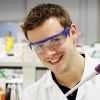
Michael Houghton
- Course: PhD in Food Biochemistry
- PhD title: Investigating the chronic effect of dietary polyphenols on the cellular stresses associated with the onset of diabetes
Can you briefly describe the area you are researching?
The effects of dietary bioactive phenolics on mitochondrial oxidative stress associated with the onset of type II diabetes mellitus.
What made you choose a research degree?
I want a career in research, probably staying in academia – it is my ambition to be a lecturer and head up my own research lab. I realised this for certain after working for a year as a research lab technician at another university.
What is it that makes you passionate about the subject you study?
I have always been interested in biochemistry, particularly nutrition and human metabolism, as it is a complex field that is related to everyday life.
Diabetes is one of the biggest health problems in the world – in 2013 it was the 8th leading cause of death – so investigating potential ways to help lower the incidence, or at least further complications, of this burden makes me passionate about my research.
Why did you choose the University of Leeds?
The postgraduate research programme at Leeds is one of the best I’d heard about. The University is a leading research institute and the School of Food Science and Nutrition itself is ranked very highly.
Furthermore, the research group I am part of is supervised by one of the leading researchers in our field.
How would you describe student life in Leeds?
Leeds is an awesome student city! It has the energy of London or Manchester but is not as daunting in size.
I have been here just over a year and am still finding cool new places to eat and drink. The nightlife is lively, from pubs and clubs to theatre and music.
There is an exceptional variety of sports and societies on offer to get involved in and if you ever want to escape city life we are surrounded by beautiful English countryside, with the Dales, Moors, Ilkley, York and the north east coast etc all within easy reach.
What do you think of the academic facilities and support services?
Academic facilities reach far and wide across campus, with libraries plus computer clusters, study areas and numerous relaxing café areas available.
Support is on offer 24/7 and ranges from a School or Faculty-level to the Students' Union and services such as Nightline.
What do you like best about the School of Food Science and Nutrition?
It is the leading food science department in the country and the lab I work in is fully equipped with state-of-the-art equipment and our group is full of experts from all over the world.
Around the School there is a very friendly atmosphere and there is always something going on – from tasting the undergraduates’ products in the food technology lab for their project work, the mini beer festival at the end of each semester as part of the undergraduate brewery course and to the School’s PhD conference. I am proud to say that I helped organise the first conference recently and it is now set to become an annual event.
What university social/sporting activities have you become involved in during your spare time?
I am a member of the University swimming and water polo club and play first team water polo in BUCS and Upolo national competitions. It is a club with more than 150 members that focuses on excelling in the water and ensuring a busy social calendar.
What would you say to other students thinking of coming to the University of Leeds?
I would definitely recommend the University for postgraduate research.
The School of Food Science and Nutrition and the University as a whole is a great institute for starting your career and achieving some world-class, groundbreaking research and is situated in a fantastic city.

